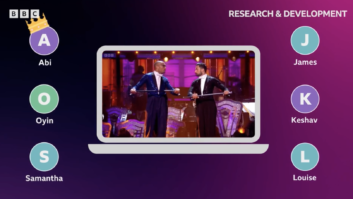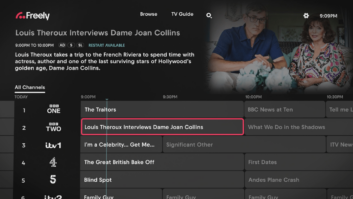
The BBC has revealed details of an experiment allowing people to control TV using just their brainwaves.
In a blog by Cyrus Saihan, head of Business Development, BBC Digital, it was disclosed that the project involved a simple low cost brainwave reading headset. The BBC has been working with UK-based user experience studio This Place, which created a ‘Mind Control’ TV prototype. It allows users to open an experimental version of BBC iPlayer and select a TV programme to view, using nothing but their brainwaves.
Saihan explained the rationale behind the experiment. “One of my areas of focus is looking at how we can innovate by using new and emerging technologies and working with third parties to explore what kinds of new audience experiences might be possible in the future.”
The first trial involved ten BBC staff members who tried out the app, and were all able to launch BBC iPlayer and start viewing a programme simply by using their minds. “It was much easier for some than it was for others, but they all managed to get it to work. And it’s been a similar story for everyone who’s tried it out in our BBC technology Blue Room since,” explained Saihan.
From the results of the experiment, two areas of interest emerged for the BBC: improving accessibility and the potential of a new user interface.
“An important potential benefit that brainwave technology might offer is the ability to improve the accessibility of media content to people with disabilities,” he remarked.
Discussing the possibilities of new interfaces, Saihan added: “The BBC is always looking at ways of using technology to satisfy people’s increasing desire to get to the digital content that they want as quickly and easily as possible such as using voice-control with BBC iPlayer on Xbox One.
“Mind control technology could be another, more advanced, way of doing this. You can imagine a world where instead of having to get up from your sofa or reach for your remote, you just think ‘put BBC One on’ when you want to watch TV.”
“It’s important to stress that it’s very early days and, while brainwave reading devices are constantly improving, their capabilities are still quite basic – the outputs on our very experimental app were limited to simple binary on/off instructions, for example.
“Our proof-of-concept is only an experiment and just a toe in the water, but it helps our initial understanding of how we might be able to control devices using our brainwaves in the years to come.”
http://www.bbc.co.uk/blogs/internet/entries/cd1e4242-3dd2-4e48-8556-8a5ecec6b056






